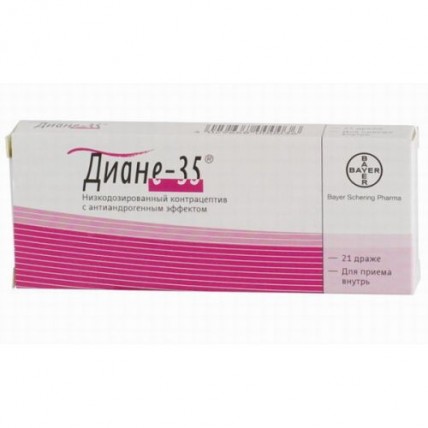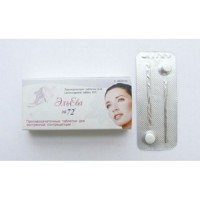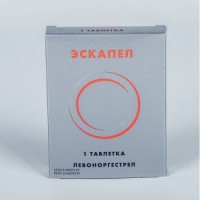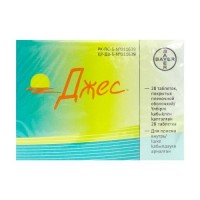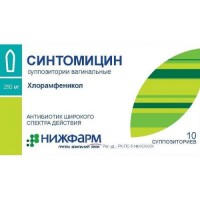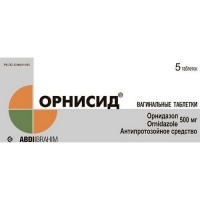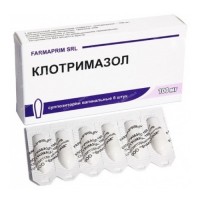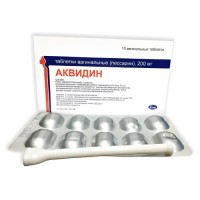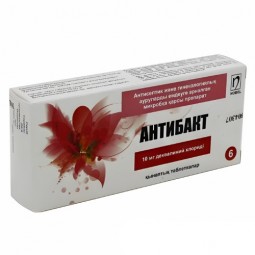Diane-35 (Cyproterone Acetate/Ethinyl Estradiol) 21 Pills
- $30.00
Sku:
19d65be8833b
Brand:
Bayer Weimar (Germany)
The instruction for medical use
of Dianeâ 35 medicine
the Trade name
Dianeâ 35
International unlicensed name
Are not present
the Dosage form
of the Dragee
Structure
One dragee contains
active agents: tsiproterona acetate of 2.0 mg
ethinylestradiol of 0.035 mg,
excipients: lactoses monohydrate, starch corn, povidone 25000, talc, magnesium stearate,
dragee cover: sucrose, povidone 700,000, macrogoal 6000, calcium carbonate, talc, glycerin of 85%, titan dioxide (E171), ferrous oxide yellow (E172), wax montaglikolevy.
Description
Round, biconvex dragees of beige color
Pharmacotherapeutic group
Sex hormones and modulators of a reproductive system. Anti-androgens. Anti-androgens and estrogen. Tsiproteron and estrogen
ATX G03HB01 Code
Pharmacological
Pharmacokinetics properties
• Tsiproterona acetate Absorption
the acetate Accepted orally a tsiproterona is quickly and completely soaked up. The maximum concentration in blood serum, equal 15 ng/ml, is reached approximately in 1.6 hours. The bioavailability is about 88%.
Tsiproteron's distribution acetate almost completely contacts seralbumin. Only 3.5-4.0% of the general serumal level of a tsiproteron of acetate are in a free form. The increase in level of the globulin, connecting sex hormones (G,CSH) induced by ethinylestradiol does not influence linking of a tsiproteron of acetate with serum proteins. The seeming volume of distribution of a tsiproteron of acetate is equal to about 986±437 l.
Tsiproteron's metabolism acetate is almost completely metabolized.
The main metabolite in blood plasma of the person is 15ß-hydroxylic derivative which is formed with participation of CYP enzyme 3A4 of a system of P450 cytochrome. Clearance speed is about 3.6 ml/min. of blood serum.
Removal
the Maintenance of a tsiproteron of acetate in blood serum is exposed to two-phase decrease which are characterized elimination half-life about 0.8 h and 2.3-3.3 days. Tsiproterona acetate is partially brought in not changed form. Metabolites of a tsiproteron of acetate are removed with urine and bile in the ratio 1:2 with elimination half-life about 43.2 hours.
Equilibrium concentration
does not influence the GSPG level in blood serum pharmacokinetics of a tsiproteron of acetate. As a result of daily administration of drug the level of content of substances in serum increases approximately by 2.5 times, an equilibrium concentration is reached in the second half of a course.
· Ethinylestradiol Absorption
After intake ethinylestradiol is soaked up quickly and completely. The maximum concentration in blood serum, equal about 71 pg/ml, is reached in 1 hour 40 minutes. During absorption and the first passage through a liver ethinylestradiol is extensively metabolized therefore its bioavailability at intake averages about 45%, and significant individual differences within 20-65% are noted.
Distribution
Ethinylestradiol almost completely (98%), though is not specific, contacts albumine. Ethinylestradiol induces synthesis of GSPG. The seeming volume of distribution of ethinylestradiol is equal to 2.8-8.6 l/kg.
Metabolism
Ethinylestradiol is exposed to a presistemny konjyugirovaniye in mucous a small intestine and in a liver. Ethinylestradiol is initially metabolized
by aromatic hydroxylation, at the same time the various hydroxylated and metilirovanny metabolites provided both in the form of free metabolites, and in the form of conjugates with glucuronic and sulfuric acids are formed.
Speed of metabolic clearance of ethinylestradiol varies from 2.3 to 7.0 ml/min.
Removal
ethinylestradiol Content in blood serum is exposed to two-phase decrease, characterized by elimination half-life about 1 hour and 10-20 hours, respectively. In not changed view from an organism it is not removed.
Metabolites of ethinylestradiol are removed by kidneys and a liver in the ratio 4:6 with elimination half-life about 24 hours.
Equilibrium concentration
Equilibrium concentration is reached approximately in the second half of a cycle of treatment when drug level in blood serum is 60% higher in comparison with a single dose.
The pharmacodynamics
the Grease and hair complex consisting of a sebaceous gland and a hair follicle is an androgen - a sensitive component of skin. The acne and seborrhea are partly caused by dysfunction of sebaceous glands which can arise under the influence of hypersensitivity to androgens or the increased levels of androgens of plasma. Both Диане® 35 active agents have positive therapeutic effect.
Tsiproterona the acetate which is contained in Dianeâ 35 is a competitive antagonist of androgenovy receptors, possesses inhibiting effect on synthesis of androgens in cells targets and promotes decrease in concentration of androgens in blood thanks to anti-gonadotropic effect.
The anti-gonadotropic effect of drug amplifies ethinylestradiol which also increases synthesis of GSPG that promotes reduction of free biologically active level of androgens in blood.
Treatment Dianeâ 35 leads – usually in 3-4 months of therapy – to healing of the existing acne rashes. Excessive fat content of hair and skin, as a rule, disappears earlier. Also the androgenozavisimy hair loss decreases. However, at the women suffering from a hirsutism, results become visible only in several months of reception.
Tsiproterona acetate is also the strong progestogen having contraceptive effect at use in a combination with ethinylestradiol. Interaction of the central and peripheral mechanisms, the most important of which should be considered suppression of an ovulation and change of properties of a cervical secret, is the cornerstone of this effect. Besides, as a result of morphological and enzymatic changes of endometrium there are extremely unfavorable conditions for implantation.
Contraceptive protection begins in the first day of administration of drug.
Indications
- treatment moderate and heavy an androgen - dependent forms of an acne (without seborrhea or followed by seborrhea) and/or a hirsutism at women of reproductive age.
For treatment of an acne drug Dianeâ 35 should be used when topical treatment or treatment by system antibiotics is not represented effective.
As drug Диане® 35 is also a hormonal contraceptive, it should not be applied in a combination with other hormonal contraceptives (see the section Contraindications).
The route of administration and doses
Dianeâ 35 interferes with an ovulation and thus, has contraceptive effect. The patients accepting Диане® 35 should not use additional hormonal contraceptives as it leads to overdose of hormones and is not necessary for effective contraceptive action.
For the same reason the women wishing pregnancy approach should not use drug Диане® 35.
Reception Dianeâ 35 has to be regular for achievement of necessary therapeutic effectiveness and the required contraceptive protection.
A route of administration
For intake.
The dragee should be accepted on the order specified on packing, every day approximately at the same time with a small amount of water. Accept on one dragee a day continuously within 21 days. Reception of each following packing begins after a 7-day break during which cancellation bleeding (menstrualnopodobny bleeding) is observed. It usually begins for 2-3 day from reception of the last dragee and can not end prior to reception of new packing. Contraceptive protection begins from the first day of reception of a dragee and remains also within 7 days when the drug is not taken. Simultaneous use of hormonal contraceptives should be stopped.
Medical examination / consultation of the doctor
before use of drug is recommended to perform full all-medical examination (including measurement of body weight, arterial blood pressure, inspection of heart, legs and skin, the analysis of urine on diabetes, hepatic tests if necessary), gynecologic survey is also necessary (including survey of mammary glands and a cytologic research of the cervical slime taken from a vaginal part of a neck of the uterus and a neck of the uterus), it is necessary to collect the detailed family medical anamnesis to define the diseases demanding treatment, and possible risks. It is necessary to exclude pregnancy. At use
of drug it is recommended to perform control examinations each six months.
It is necessary to exclude disturbances from the system of fibrillation if at blood relatives at early age tromboembolic episodes were noted (for example, a deep vein thrombosis, a stroke, heart attack). It is also necessary to pay attention that reception of oral contraceptives does not protect from HIV infections (AIDS) and other diseases, sexually transmitted.
How to begin reception Dianeâ 35
- in the absence of reception of any hormonal contraceptives last month
the Reception Dianeâ 35 begins in the first day of a menstrual cycle (i.e. in the first day of menstrual bleeding). The beginning of reception for 2-5 day of a menstrual cycle is allowed, but in this case it is recommended to use in addition a barrier method of contraception during the first 7 days of reception of a dragee from the first packing.
Women with an amenorrhea can begin administration of drug right after appointment as the doctor, in that case day of reception of the first dragee corresponds to the first day of a menstrual cycle, and further reception continues according to recommendations.
- upon transition from the combined hormonal contraceptives (the combined oral contraceptive, a vaginal ring, a transdermalny plaster)
it is preferable to begin reception Dianeâ 35 next day after reception of the last gormonsoderzhashchy dragee from the previous packing, but by no means no later than the next day after a usual 7-day break in reception (for the drugs containing 21 dragees) or after intake of the last not containing hormone of a dragee (for the drugs containing 28 dragees in packing). Upon transition from a vaginal ring or a transdermalny plaster it is preferable to begin reception Dianeâ 35 in day of removal of the last ring or plaster of cyclic packing, but by no means no later than that day when the following ring or a plaster had to be applied.
- upon transition from the contraceptives containing only gestagena (mini-drank, injection forms, an implant), or releasing gestagen an intrauterine system (Naval Forces).
The woman can pass with mini-saw on Dianeâ 35 in any day (without interruption), from an implant or Naval Forces with gestageny - in day of its removal, from an injection form - from day when the following injection would have to be made. In all cases it is necessary to use in addition barrier method of contraception during the first 7 days of reception of a dragee.
- after abortion in the first trimester of pregnancy
the Woman can begin administration of drug immediately. At observance of this condition the woman does not need additional contraceptive protection.
- after the delivery or abortion in the second trimester of pregnancy
it has to be recommended to Woman to begin administration of drug for 21-28 day after the delivery or abortion in the second trimester of pregnancy. If reception is begun later, it is necessary to use in addition barrier method of contraception during the first 7 days of reception of a dragee. However if the woman already led sex life, prior to reception Dianeâ 35 pregnancy has to be excluded or it is necessary to wait for the first periods.
Use duration
Time before relief of symptoms of a disease is not less than three months. The attending physician has to perform regular examinations to define need of continuation of treatment.
Duration of administration of drug Диане® 35 is defined by disease severity and efficiency of treatment. At treatment of an acne and seborrhea the effect usually occurs earlier, than at treatment of a hirsutism. After the intensity of symptoms decreases, recommended to accept Diane-35 at least during 3 more or 4 cycles.
In case of lack of effect on therapy or in case of insufficient effect on treatment
- severe forms of an acne or seborrhea within not less than six months or
- a hirsutism within not less than 12 months
it is necessary to consider the possibility of a concomitant use of drugs Dianeâ-35 and tablets Андрокур® 10 of mg or tablets Андрокур® 50 of mg: or what is more preferable, to reconsider a treatment technique.
When symptoms of an androgenization weaken, but contraceptive action still is required, it is necessary to pass to use of the low-dosed oral contraceptive. In case of repeated manifestation of androgenic symptoms the therapy resuming by drug Dianeâ-35 is possible.
In case of resuming of reception Dianeâ 35 (after a break between administrations of drug within 4 weeks and more) it is necessary to consider the increased risk of developing a venous thrombembolia (see the section Special Instructions).
Reception of the passed dragees
If delay in reception of a dragee made less than 12 hours, contraceptive protection does not decrease. The woman has to accept a dragee as soon as possible, the following dragee is accepted in usual time.
If delay in reception of a dragee made more than 12 hours, contraceptive protection can be reduced. At the same time it is possible to be guided by the following two basic rules:
• Reception of a dragee never has to be interrupted, more than for 7 days.
• 7 days of continuous reception of a dragee are required for achievement of adequate suppression gipotalamo - a hypophysial and ovarian system.
Respectively the following advice can be given if delay in reception of a dragee made more than 12 hours (an interval from the moment of reception of the last dragee more than 36 hours):
- the first week of administration of drug
the Woman has to accept the last passed dragee as soon as possible as soon as remembers (even if it means reception of two dragees at the same time). The following dragee is accepted in usual time. The barrier method of contraception (for example, condom) during the next 7 days has to be in addition used. If sexual contacts took place within a week before the admission of a dragee, it is necessary to consider pregnancy approach probability.
What more dragee is passed by, and than closer they to a break in intake of active agents, that high probability of pregnancy.
- the second week of administration of drug
the Woman has to accept the last passed dragee as soon as possible as soon as remembers (even if it means reception of two dragees at the same time). The following dragee is accepted in usual time.
Provided that the woman accepted a dragee correctly within 7 days preceding the first passed dragee there is no need for use of additional contraceptive measures. Otherwise and also at the admission of two and more dragees it is necessary to use in addition barrier methods of contraception (for example, condom) within 7 days.
- the third week of administration of drug
the Risk of decrease in reliability is inevitable because of the forthcoming break in reception of a dragee.
The woman has to adhere strictly to one of two following options. At the same time, if in 7 days preceding the first passed dragee all dragees were accepted correctly, there is no need to use additional contraceptive methods.
1. The woman has to accept the last passed dragee as soon as possible (even if it means, reception of two dragees at the same time). The following dragee is accepted in usual time, dragees from the current packing will not end yet. The following packing should be begun at once. Bleeding of cancellation is improbable, the second packing will not end yet, but the smearing discharges or breakthrough bleedings can be noted during reception of a dragee.
2. The woman can also interrupt reception of a dragee from the current packing. Then it has to take a break for 7 days, including day of the admission of a dragee and then begin reception of new packing.
If the woman missed reception of a dragee, and then during a break in reception of a dragee she has no cancellation bleeding, it is necessary to exclude pregnancy. Absence of bleeding of cancellation
in the absence of cancellation bleeding, it is necessary to stop administration of drug until pregnancy is excluded.
Councils in case of intermenstrual bleeding
it is Absolutely necessary to continue administration of drug Dianeâ-35 in case of intermenstrual bleeding. Small blood discharges usually stop spontaneously or are eliminated within 4 - 5 days – the same as intermenstrual bleeding of the same intensity as menstrual (breakthrough bleeding) – as a result of additional simultaneous use of 25 - 50 mkg of ethinylestradiol (i.e. not after reception of the last dragee from packing Dianeâ-35).
If breakthrough bleeding does not stop or recurs, it is necessary to perform careful examination, including a curettage to exclude the organic reason.
The aforesaid concerns also bloody discharges which occur through irregular periods during several consecutive cycles or occur for the first time after long administration of drug Dianeâ-35. In such cases the bleeding usually is a consequence of organic changes, but not effects of medicine.
Councils in case of gastrointestinal disorders
In heavy vomiting or diarrhea the absorption of active agents of drug can be incomplete. In this case it is necessary to take additional measures of contraception.
If the woman within 3-4 hours after reception has a dragee Dianeâ 35 vomiting was observed, it is necessary to be guided by the councils concerning the admission of a dragee. If the woman does not want to change the normal mode of administration of drug, she has to accept if necessary an additional dragee (or several dragee) from other packing.
Liver diseases
In a case of a viral hepatitis it is not necessary to use drugs, such as Dianeâ-35 before the expiration about six months after recovery (when hepatic tests return to normal indicators).
Additional information for special categories of patients Children and teenagers
Drug Dianeâ 35 is shown only after approach of menarche.
Patients of advanced age
it is not applicable. Drug Dianeâ 35 is not shown to women after approach of a menopause.
Patients with disturbances from a liver
Drug Dianeâ 35 is contraindicated to women with a serious illness of a liver until indicators of function of a liver do not return to normal Patients with disturbances from kidneys
Drug Dianeâ 35 specially was not studied at patients with a renal failure. The available data do not assume change of treatment at such patients.
Side effects
At all women taking drug Dianeâ 35 the risk of developing a thrombembolia increases.
Accessory factors can enhance risk (smoking, arterial hypertension, disturbances of fibrillation or disturbance of lipidic metabolism, obesity, the varicosity postponed earlier phlebitis and thrombosis), watch the section Special Instructions.
Information on other side effects, such as liver tumors, cervical cancer and cancer of mammary glands, you look in the section Special Instructions. The following undesirable effects were described at the women accepting Dianeâ 35 and their interrelation with drug was not is confirmed, disproved:
Often (≥1/100)
- nausea, an abdominal pain
- a body weight increase
- a headache, depressive mood, changes of mood
- morbidity and tension of mammary glands, intermenstrual bleeding
Infrequently (≥1/1000, & lt, 1/100)
- vomiting, diarrhea
- a liquid delay
- migraine
- decrease in a libido
- increase in mammary glands
- rash, urticaria, a hloazma (emergence of a nevus pigmentosus on a face)
is rare (& lt, 1/1000)
- reactions of hypersensitivity
- bad shipping of contact lenses
- a thrombembolia
- decrease in body weight
- increase in a libido
- vaginal discharges, discharges from mammary glands
- a knotty erythema, a multiformny erythema
Data of post-marketing observations:
- increase in arterial blood pressure
was reported About the following serious side effects described in the section Special Instructions at the women applying Dianeâ 35:
- venous thromboembolic disturbances
- arterial thromboembolic disturbances
- cerebrovascular disturbances
- arterial hypertension
- a gipertriglitseridemiya
- disturbance of tolerance to glucose or effects of peripheral insulin resistance
- a liver tumor (benign and malignant)
- abnormal liver functions
- a hloazma
- emergence or deterioration in the following states which connection with reception of the combined oral contraceptives is authentically not established: jaundice and/or an itching connected with a cholestasia, forming of stones in a gall bladder, a porphyria, a system lupus erythematosus, a hemolytic uraemic syndrome, Sydenham's chorea (hysterical chorea), herpes of pregnant women, a hearing loss connected with an otosclerosis, Crohn's disease and nonspecific ulcer colitis, cervical cancer
- at women with a hereditary Quincke's disease provoking or aggravation of symptoms of a disease under the influence of exogenous estrogen
the Frequency of the diagnosis of a breast cancer is a little raised among the women accepting oral contraceptives. As the breast cancer is noted seldom at women 40 years are younger, increase in number of diagnoses is insignificant in relation to the general risk of developing this disease. Detailed information contains in the section Special Instructions and Contraindications.
Action on tissue of a mammary gland
Sex hormones have effect on tissue of a mammary gland as probably increase its sensitivity to influence of other cancerogenic factors. Sex hormones in fact represent only one of various possible risk factors which are not connected with reception of oral contraceptives. In epidemiological researches during which possible communication between use of hormonal contraceptive drugs and development of a breast cancer was analyzed it was not succeeded to answer unambiguously a question whether really specified disease is more often noted before middle age at women who apply contraceptives for a long time, since young age.
Also during reception of the combined oral contraceptives strengthening of an endogenous depression and epilepsy is noted.
In case at the women suffering from a hirsutism considerable strengthening of symptoms is observed, when carrying out the differential diagnosis it is necessary to consider other reasons (an androgenprodutsiruyushchy tumor, a fermentopatiya in adrenal gland bark).
The deviation of indicators of clinical biochemical analysis from norm Blood sedimentation rate can raise without presence of a disease. Cases of increase in levels of copper and iron in blood serum and also cases of strengthening of activity of alkaline phosphatase of leukocytes were noted.
Other metabolic functions
Can appear rare disturbances of metabolism of folic acid and tryptophane.
At regular use drug Dianeâ 35 has contraceptive effect thanks to the structure. Irregular reception Dianeâ 35 can lead to disturbance of a menstrual cycle. Respect for regularity at reception Dianeâ 35 is very important both for prevention of disturbances of a menstrual cycle, and for protection from pregnancy (as the tsiproterona acetate can make impact on the developing child).
Contraindications
the Drugs containing a combination estrogen / gestagenov not have to be used in the presence of any of the states which are listed below. If any of these states develop for the first time against the background of reception, drug has to be immediately cancelled.
- hypersensitivity to any of drug components
- combined use with other hormonal contraceptives
- venous thrombosis now or in the anamnesis (for example, a deep vein thrombosis, a pulmonary embolism
- existence in the individual or family anamnesis of the known idiopathic venous thrombembolia (VTE) at which in the family anamnesis relation to VTE at brothers is had, sisters or parents at rather early age)
- arterial thrombosis now or in the anamnesis (for example, a myocardial infarction) or the previous disturbances (for example, stenocardia and the tranzitorny ischemic attacks)
- cerebrovascular disturbances now or in the anamnesis
- existence of the expressed or multiple factors of risk of developing venous or arterial thrombosis (see the section Special Instructions), for example:
· diabetes with vascular complications
· profound arterial hypertension
· the expressed dislipoproteinemiya
- hereditarily the caused or acquired predisposition to a venous or arterial thrombembolia (for example, resistance to the activated protein With (ARS resistance), deficiency of antithrombin III, a protein With, S protein, a gipergomotsisteinemiya and anti-phospholipidic antibodies (antibodies to cardiolipin and lupoid anticoagulant)
- drepanocytic anemia
- a serious illness of a liver, including disturbance of an excretory system, such as syndrome the Cudgel Johnson and the Rotor until indicators of function of a liver do not return to normal
- liver tumors (benign or malignant) now or in the anamnesis
- vaginal bleeding of not clear genesis
- migraine with focal neurologic symptoms in the anamnesis
- smoking
- the revealed hormonedependent malignant diseases (for example, genitals or mammary glands) or suspicion on them
- existence in the anamnesis of idiopathic jaundice of pregnant women, a heavy itching or herpes of pregnant women, deterioration in an otosclerosis during the previous pregnancies
- desirable pregnancy, pregnancy and the period of chest feeding
Dianeâ 35 is not applied at men.
Medicinal interactions
Effects of other drugs on
Diana â 35 Vozmozhno interaction with the medicines inducing microsomal enzymes of a liver that can promote to increase of clearance of sex hormones and a message to breakthrough bleedings and/or decrease in contraceptive efficiency of drug.
During intake of such drugs, the woman should use in addition a barrier method of contraception in addition to Dianeâ 35 or to choose other method of contraception. At the same time the barrier method of contraception should be used during the period of the accompanying administration of drugs and within 28 days after their cancellation.
If the period of use of a barrier method of protection comes to an end later, than tablets in packing, it is necessary to pass to the following packing Dianeâ 35 without usual break in reception of tablets.
The substances increasing clearance Dianeâ 35 (reducing efficiency owing to induction of enzymes of a liver), for example:
barbiturates, rifampicin and antiepileptic drugs (such as barbeksaklon, carbamazepine, Phenytoinum, Primidonum), there are also assumptions concerning an okskarbazepin, the topiramat, the felbamat, griseofulvin and the drugs containing a St. John's wort.
Substances with various effects on clearance Dianeâ 35
At the combined use about Dianeâ 35 many VICh/HCV-inhibitors of protease and nenukleozidny inhibitors of reverse transcriptase can raise or reduce concentration of estrogen or progestins in blood plasma. The specified changes in certain cases can have relevant value.
Influence of combinations it is oestrogenic / progestagen on other drugs
of the Combination is oestrogenic / progestagen, it is similar Dianeâ 35 can influence metabolism of some other drugs that leads to increase (for example, cyclosporine) or to reduction (for example, a lamotridzhina) their concentration in blood plasma and fabrics.
Dose adjustment of glucose-lowering drugs can be required, considering influence on tolerance to glucose.
Other interactions
Laboratory tests
Administration of drugs it is similar Dianeâ 35 the corticosteroid - the connecting globulin and fractions of lipids/lipoproteids, indicators of carbohydrate metabolism, parameters of coagulation and a fibrinolysis can affect results of some laboratory tests, including indicators of function of a liver, kidneys, a thyroid gland, adrenal glands, level of transport proteins in plasma, for example. However these changes usually do not overstep the bounds of normal values.
It is necessary to warn the woman that Диане® 35 cannot be applied in addition with other hormonal contraceptives. Intake of such drugs needs to be stopped before an initiation of treatment drug Диане® 35.
Special indications
of the Precautionary measure and prevention
Drug Диане® 35 contains progestogen of a tsiproteron acetate and ethinylestradiol is oestrogenic and it is applied on protya
to Develop
of Dianeâ 35 medicine
the Trade name
Dianeâ 35
International unlicensed name
Are not present
the Dosage form
of the Dragee
Structure
One dragee contains
active agents: tsiproterona acetate of 2.0 mg
ethinylestradiol of 0.035 mg,
excipients: lactoses monohydrate, starch corn, povidone 25000, talc, magnesium stearate,
dragee cover: sucrose, povidone 700,000, macrogoal 6000, calcium carbonate, talc, glycerin of 85%, titan dioxide (E171), ferrous oxide yellow (E172), wax montaglikolevy.
Description
Round, biconvex dragees of beige color
Pharmacotherapeutic group
Sex hormones and modulators of a reproductive system. Anti-androgens. Anti-androgens and estrogen. Tsiproteron and estrogen
ATX G03HB01 Code
Pharmacological
Pharmacokinetics properties
• Tsiproterona acetate Absorption
the acetate Accepted orally a tsiproterona is quickly and completely soaked up. The maximum concentration in blood serum, equal 15 ng/ml, is reached approximately in 1.6 hours. The bioavailability is about 88%.
Tsiproteron's distribution acetate almost completely contacts seralbumin. Only 3.5-4.0% of the general serumal level of a tsiproteron of acetate are in a free form. The increase in level of the globulin, connecting sex hormones (G,CSH) induced by ethinylestradiol does not influence linking of a tsiproteron of acetate with serum proteins. The seeming volume of distribution of a tsiproteron of acetate is equal to about 986±437 l.
Tsiproteron's metabolism acetate is almost completely metabolized.
The main metabolite in blood plasma of the person is 15ß-hydroxylic derivative which is formed with participation of CYP enzyme 3A4 of a system of P450 cytochrome. Clearance speed is about 3.6 ml/min. of blood serum.
Removal
the Maintenance of a tsiproteron of acetate in blood serum is exposed to two-phase decrease which are characterized elimination half-life about 0.8 h and 2.3-3.3 days. Tsiproterona acetate is partially brought in not changed form. Metabolites of a tsiproteron of acetate are removed with urine and bile in the ratio 1:2 with elimination half-life about 43.2 hours.
Equilibrium concentration
does not influence the GSPG level in blood serum pharmacokinetics of a tsiproteron of acetate. As a result of daily administration of drug the level of content of substances in serum increases approximately by 2.5 times, an equilibrium concentration is reached in the second half of a course.
· Ethinylestradiol Absorption
After intake ethinylestradiol is soaked up quickly and completely. The maximum concentration in blood serum, equal about 71 pg/ml, is reached in 1 hour 40 minutes. During absorption and the first passage through a liver ethinylestradiol is extensively metabolized therefore its bioavailability at intake averages about 45%, and significant individual differences within 20-65% are noted.
Distribution
Ethinylestradiol almost completely (98%), though is not specific, contacts albumine. Ethinylestradiol induces synthesis of GSPG. The seeming volume of distribution of ethinylestradiol is equal to 2.8-8.6 l/kg.
Metabolism
Ethinylestradiol is exposed to a presistemny konjyugirovaniye in mucous a small intestine and in a liver. Ethinylestradiol is initially metabolized
by aromatic hydroxylation, at the same time the various hydroxylated and metilirovanny metabolites provided both in the form of free metabolites, and in the form of conjugates with glucuronic and sulfuric acids are formed.
Speed of metabolic clearance of ethinylestradiol varies from 2.3 to 7.0 ml/min.
Removal
ethinylestradiol Content in blood serum is exposed to two-phase decrease, characterized by elimination half-life about 1 hour and 10-20 hours, respectively. In not changed view from an organism it is not removed.
Metabolites of ethinylestradiol are removed by kidneys and a liver in the ratio 4:6 with elimination half-life about 24 hours.
Equilibrium concentration
Equilibrium concentration is reached approximately in the second half of a cycle of treatment when drug level in blood serum is 60% higher in comparison with a single dose.
The pharmacodynamics
the Grease and hair complex consisting of a sebaceous gland and a hair follicle is an androgen - a sensitive component of skin. The acne and seborrhea are partly caused by dysfunction of sebaceous glands which can arise under the influence of hypersensitivity to androgens or the increased levels of androgens of plasma. Both Диане® 35 active agents have positive therapeutic effect.
Tsiproterona the acetate which is contained in Dianeâ 35 is a competitive antagonist of androgenovy receptors, possesses inhibiting effect on synthesis of androgens in cells targets and promotes decrease in concentration of androgens in blood thanks to anti-gonadotropic effect.
The anti-gonadotropic effect of drug amplifies ethinylestradiol which also increases synthesis of GSPG that promotes reduction of free biologically active level of androgens in blood.
Treatment Dianeâ 35 leads – usually in 3-4 months of therapy – to healing of the existing acne rashes. Excessive fat content of hair and skin, as a rule, disappears earlier. Also the androgenozavisimy hair loss decreases. However, at the women suffering from a hirsutism, results become visible only in several months of reception.
Tsiproterona acetate is also the strong progestogen having contraceptive effect at use in a combination with ethinylestradiol. Interaction of the central and peripheral mechanisms, the most important of which should be considered suppression of an ovulation and change of properties of a cervical secret, is the cornerstone of this effect. Besides, as a result of morphological and enzymatic changes of endometrium there are extremely unfavorable conditions for implantation.
Contraceptive protection begins in the first day of administration of drug.
Indications
- treatment moderate and heavy an androgen - dependent forms of an acne (without seborrhea or followed by seborrhea) and/or a hirsutism at women of reproductive age.
For treatment of an acne drug Dianeâ 35 should be used when topical treatment or treatment by system antibiotics is not represented effective.
As drug Диане® 35 is also a hormonal contraceptive, it should not be applied in a combination with other hormonal contraceptives (see the section Contraindications).
The route of administration and doses
Dianeâ 35 interferes with an ovulation and thus, has contraceptive effect. The patients accepting Диане® 35 should not use additional hormonal contraceptives as it leads to overdose of hormones and is not necessary for effective contraceptive action.
For the same reason the women wishing pregnancy approach should not use drug Диане® 35.
Reception Dianeâ 35 has to be regular for achievement of necessary therapeutic effectiveness and the required contraceptive protection.
A route of administration
For intake.
The dragee should be accepted on the order specified on packing, every day approximately at the same time with a small amount of water. Accept on one dragee a day continuously within 21 days. Reception of each following packing begins after a 7-day break during which cancellation bleeding (menstrualnopodobny bleeding) is observed. It usually begins for 2-3 day from reception of the last dragee and can not end prior to reception of new packing. Contraceptive protection begins from the first day of reception of a dragee and remains also within 7 days when the drug is not taken. Simultaneous use of hormonal contraceptives should be stopped.
Medical examination / consultation of the doctor
before use of drug is recommended to perform full all-medical examination (including measurement of body weight, arterial blood pressure, inspection of heart, legs and skin, the analysis of urine on diabetes, hepatic tests if necessary), gynecologic survey is also necessary (including survey of mammary glands and a cytologic research of the cervical slime taken from a vaginal part of a neck of the uterus and a neck of the uterus), it is necessary to collect the detailed family medical anamnesis to define the diseases demanding treatment, and possible risks. It is necessary to exclude pregnancy. At use
of drug it is recommended to perform control examinations each six months.
It is necessary to exclude disturbances from the system of fibrillation if at blood relatives at early age tromboembolic episodes were noted (for example, a deep vein thrombosis, a stroke, heart attack). It is also necessary to pay attention that reception of oral contraceptives does not protect from HIV infections (AIDS) and other diseases, sexually transmitted.
How to begin reception Dianeâ 35
- in the absence of reception of any hormonal contraceptives last month
the Reception Dianeâ 35 begins in the first day of a menstrual cycle (i.e. in the first day of menstrual bleeding). The beginning of reception for 2-5 day of a menstrual cycle is allowed, but in this case it is recommended to use in addition a barrier method of contraception during the first 7 days of reception of a dragee from the first packing.
Women with an amenorrhea can begin administration of drug right after appointment as the doctor, in that case day of reception of the first dragee corresponds to the first day of a menstrual cycle, and further reception continues according to recommendations.
- upon transition from the combined hormonal contraceptives (the combined oral contraceptive, a vaginal ring, a transdermalny plaster)
it is preferable to begin reception Dianeâ 35 next day after reception of the last gormonsoderzhashchy dragee from the previous packing, but by no means no later than the next day after a usual 7-day break in reception (for the drugs containing 21 dragees) or after intake of the last not containing hormone of a dragee (for the drugs containing 28 dragees in packing). Upon transition from a vaginal ring or a transdermalny plaster it is preferable to begin reception Dianeâ 35 in day of removal of the last ring or plaster of cyclic packing, but by no means no later than that day when the following ring or a plaster had to be applied.
- upon transition from the contraceptives containing only gestagena (mini-drank, injection forms, an implant), or releasing gestagen an intrauterine system (Naval Forces).
The woman can pass with mini-saw on Dianeâ 35 in any day (without interruption), from an implant or Naval Forces with gestageny - in day of its removal, from an injection form - from day when the following injection would have to be made. In all cases it is necessary to use in addition barrier method of contraception during the first 7 days of reception of a dragee.
- after abortion in the first trimester of pregnancy
the Woman can begin administration of drug immediately. At observance of this condition the woman does not need additional contraceptive protection.
- after the delivery or abortion in the second trimester of pregnancy
it has to be recommended to Woman to begin administration of drug for 21-28 day after the delivery or abortion in the second trimester of pregnancy. If reception is begun later, it is necessary to use in addition barrier method of contraception during the first 7 days of reception of a dragee. However if the woman already led sex life, prior to reception Dianeâ 35 pregnancy has to be excluded or it is necessary to wait for the first periods.
Use duration
Time before relief of symptoms of a disease is not less than three months. The attending physician has to perform regular examinations to define need of continuation of treatment.
Duration of administration of drug Диане® 35 is defined by disease severity and efficiency of treatment. At treatment of an acne and seborrhea the effect usually occurs earlier, than at treatment of a hirsutism. After the intensity of symptoms decreases, recommended to accept Diane-35 at least during 3 more or 4 cycles.
In case of lack of effect on therapy or in case of insufficient effect on treatment
- severe forms of an acne or seborrhea within not less than six months or
- a hirsutism within not less than 12 months
it is necessary to consider the possibility of a concomitant use of drugs Dianeâ-35 and tablets Андрокур® 10 of mg or tablets Андрокур® 50 of mg: or what is more preferable, to reconsider a treatment technique.
When symptoms of an androgenization weaken, but contraceptive action still is required, it is necessary to pass to use of the low-dosed oral contraceptive. In case of repeated manifestation of androgenic symptoms the therapy resuming by drug Dianeâ-35 is possible.
In case of resuming of reception Dianeâ 35 (after a break between administrations of drug within 4 weeks and more) it is necessary to consider the increased risk of developing a venous thrombembolia (see the section Special Instructions).
Reception of the passed dragees
If delay in reception of a dragee made less than 12 hours, contraceptive protection does not decrease. The woman has to accept a dragee as soon as possible, the following dragee is accepted in usual time.
If delay in reception of a dragee made more than 12 hours, contraceptive protection can be reduced. At the same time it is possible to be guided by the following two basic rules:
• Reception of a dragee never has to be interrupted, more than for 7 days.
• 7 days of continuous reception of a dragee are required for achievement of adequate suppression gipotalamo - a hypophysial and ovarian system.
Respectively the following advice can be given if delay in reception of a dragee made more than 12 hours (an interval from the moment of reception of the last dragee more than 36 hours):
- the first week of administration of drug
the Woman has to accept the last passed dragee as soon as possible as soon as remembers (even if it means reception of two dragees at the same time). The following dragee is accepted in usual time. The barrier method of contraception (for example, condom) during the next 7 days has to be in addition used. If sexual contacts took place within a week before the admission of a dragee, it is necessary to consider pregnancy approach probability.
What more dragee is passed by, and than closer they to a break in intake of active agents, that high probability of pregnancy.
- the second week of administration of drug
the Woman has to accept the last passed dragee as soon as possible as soon as remembers (even if it means reception of two dragees at the same time). The following dragee is accepted in usual time.
Provided that the woman accepted a dragee correctly within 7 days preceding the first passed dragee there is no need for use of additional contraceptive measures. Otherwise and also at the admission of two and more dragees it is necessary to use in addition barrier methods of contraception (for example, condom) within 7 days.
- the third week of administration of drug
the Risk of decrease in reliability is inevitable because of the forthcoming break in reception of a dragee.
The woman has to adhere strictly to one of two following options. At the same time, if in 7 days preceding the first passed dragee all dragees were accepted correctly, there is no need to use additional contraceptive methods.
1. The woman has to accept the last passed dragee as soon as possible (even if it means, reception of two dragees at the same time). The following dragee is accepted in usual time, dragees from the current packing will not end yet. The following packing should be begun at once. Bleeding of cancellation is improbable, the second packing will not end yet, but the smearing discharges or breakthrough bleedings can be noted during reception of a dragee.
2. The woman can also interrupt reception of a dragee from the current packing. Then it has to take a break for 7 days, including day of the admission of a dragee and then begin reception of new packing.
If the woman missed reception of a dragee, and then during a break in reception of a dragee she has no cancellation bleeding, it is necessary to exclude pregnancy. Absence of bleeding of cancellation
in the absence of cancellation bleeding, it is necessary to stop administration of drug until pregnancy is excluded.
Councils in case of intermenstrual bleeding
it is Absolutely necessary to continue administration of drug Dianeâ-35 in case of intermenstrual bleeding. Small blood discharges usually stop spontaneously or are eliminated within 4 - 5 days – the same as intermenstrual bleeding of the same intensity as menstrual (breakthrough bleeding) – as a result of additional simultaneous use of 25 - 50 mkg of ethinylestradiol (i.e. not after reception of the last dragee from packing Dianeâ-35).
If breakthrough bleeding does not stop or recurs, it is necessary to perform careful examination, including a curettage to exclude the organic reason.
The aforesaid concerns also bloody discharges which occur through irregular periods during several consecutive cycles or occur for the first time after long administration of drug Dianeâ-35. In such cases the bleeding usually is a consequence of organic changes, but not effects of medicine.
Councils in case of gastrointestinal disorders
In heavy vomiting or diarrhea the absorption of active agents of drug can be incomplete. In this case it is necessary to take additional measures of contraception.
If the woman within 3-4 hours after reception has a dragee Dianeâ 35 vomiting was observed, it is necessary to be guided by the councils concerning the admission of a dragee. If the woman does not want to change the normal mode of administration of drug, she has to accept if necessary an additional dragee (or several dragee) from other packing.
Liver diseases
In a case of a viral hepatitis it is not necessary to use drugs, such as Dianeâ-35 before the expiration about six months after recovery (when hepatic tests return to normal indicators).
Additional information for special categories of patients Children and teenagers
Drug Dianeâ 35 is shown only after approach of menarche.
Patients of advanced age
it is not applicable. Drug Dianeâ 35 is not shown to women after approach of a menopause.
Patients with disturbances from a liver
Drug Dianeâ 35 is contraindicated to women with a serious illness of a liver until indicators of function of a liver do not return to normal Patients with disturbances from kidneys
Drug Dianeâ 35 specially was not studied at patients with a renal failure. The available data do not assume change of treatment at such patients.
Side effects
At all women taking drug Dianeâ 35 the risk of developing a thrombembolia increases.
Accessory factors can enhance risk (smoking, arterial hypertension, disturbances of fibrillation or disturbance of lipidic metabolism, obesity, the varicosity postponed earlier phlebitis and thrombosis), watch the section Special Instructions.
Information on other side effects, such as liver tumors, cervical cancer and cancer of mammary glands, you look in the section Special Instructions. The following undesirable effects were described at the women accepting Dianeâ 35 and their interrelation with drug was not is confirmed, disproved:
Often (≥1/100)
- nausea, an abdominal pain
- a body weight increase
- a headache, depressive mood, changes of mood
- morbidity and tension of mammary glands, intermenstrual bleeding
Infrequently (≥1/1000, & lt, 1/100)
- vomiting, diarrhea
- a liquid delay
- migraine
- decrease in a libido
- increase in mammary glands
- rash, urticaria, a hloazma (emergence of a nevus pigmentosus on a face)
is rare (& lt, 1/1000)
- reactions of hypersensitivity
- bad shipping of contact lenses
- a thrombembolia
- decrease in body weight
- increase in a libido
- vaginal discharges, discharges from mammary glands
- a knotty erythema, a multiformny erythema
Data of post-marketing observations:
- increase in arterial blood pressure
was reported About the following serious side effects described in the section Special Instructions at the women applying Dianeâ 35:
- venous thromboembolic disturbances
- arterial thromboembolic disturbances
- cerebrovascular disturbances
- arterial hypertension
- a gipertriglitseridemiya
- disturbance of tolerance to glucose or effects of peripheral insulin resistance
- a liver tumor (benign and malignant)
- abnormal liver functions
- a hloazma
- emergence or deterioration in the following states which connection with reception of the combined oral contraceptives is authentically not established: jaundice and/or an itching connected with a cholestasia, forming of stones in a gall bladder, a porphyria, a system lupus erythematosus, a hemolytic uraemic syndrome, Sydenham's chorea (hysterical chorea), herpes of pregnant women, a hearing loss connected with an otosclerosis, Crohn's disease and nonspecific ulcer colitis, cervical cancer
- at women with a hereditary Quincke's disease provoking or aggravation of symptoms of a disease under the influence of exogenous estrogen
the Frequency of the diagnosis of a breast cancer is a little raised among the women accepting oral contraceptives. As the breast cancer is noted seldom at women 40 years are younger, increase in number of diagnoses is insignificant in relation to the general risk of developing this disease. Detailed information contains in the section Special Instructions and Contraindications.
Action on tissue of a mammary gland
Sex hormones have effect on tissue of a mammary gland as probably increase its sensitivity to influence of other cancerogenic factors. Sex hormones in fact represent only one of various possible risk factors which are not connected with reception of oral contraceptives. In epidemiological researches during which possible communication between use of hormonal contraceptive drugs and development of a breast cancer was analyzed it was not succeeded to answer unambiguously a question whether really specified disease is more often noted before middle age at women who apply contraceptives for a long time, since young age.
Also during reception of the combined oral contraceptives strengthening of an endogenous depression and epilepsy is noted.
In case at the women suffering from a hirsutism considerable strengthening of symptoms is observed, when carrying out the differential diagnosis it is necessary to consider other reasons (an androgenprodutsiruyushchy tumor, a fermentopatiya in adrenal gland bark).
The deviation of indicators of clinical biochemical analysis from norm Blood sedimentation rate can raise without presence of a disease. Cases of increase in levels of copper and iron in blood serum and also cases of strengthening of activity of alkaline phosphatase of leukocytes were noted.
Other metabolic functions
Can appear rare disturbances of metabolism of folic acid and tryptophane.
At regular use drug Dianeâ 35 has contraceptive effect thanks to the structure. Irregular reception Dianeâ 35 can lead to disturbance of a menstrual cycle. Respect for regularity at reception Dianeâ 35 is very important both for prevention of disturbances of a menstrual cycle, and for protection from pregnancy (as the tsiproterona acetate can make impact on the developing child).
Contraindications
the Drugs containing a combination estrogen / gestagenov not have to be used in the presence of any of the states which are listed below. If any of these states develop for the first time against the background of reception, drug has to be immediately cancelled.
- hypersensitivity to any of drug components
- combined use with other hormonal contraceptives
- venous thrombosis now or in the anamnesis (for example, a deep vein thrombosis, a pulmonary embolism
- existence in the individual or family anamnesis of the known idiopathic venous thrombembolia (VTE) at which in the family anamnesis relation to VTE at brothers is had, sisters or parents at rather early age)
- arterial thrombosis now or in the anamnesis (for example, a myocardial infarction) or the previous disturbances (for example, stenocardia and the tranzitorny ischemic attacks)
- cerebrovascular disturbances now or in the anamnesis
- existence of the expressed or multiple factors of risk of developing venous or arterial thrombosis (see the section Special Instructions), for example:
· diabetes with vascular complications
· profound arterial hypertension
· the expressed dislipoproteinemiya
- hereditarily the caused or acquired predisposition to a venous or arterial thrombembolia (for example, resistance to the activated protein With (ARS resistance), deficiency of antithrombin III, a protein With, S protein, a gipergomotsisteinemiya and anti-phospholipidic antibodies (antibodies to cardiolipin and lupoid anticoagulant)
- drepanocytic anemia
- a serious illness of a liver, including disturbance of an excretory system, such as syndrome the Cudgel Johnson and the Rotor until indicators of function of a liver do not return to normal
- liver tumors (benign or malignant) now or in the anamnesis
- vaginal bleeding of not clear genesis
- migraine with focal neurologic symptoms in the anamnesis
- smoking
- the revealed hormonedependent malignant diseases (for example, genitals or mammary glands) or suspicion on them
- existence in the anamnesis of idiopathic jaundice of pregnant women, a heavy itching or herpes of pregnant women, deterioration in an otosclerosis during the previous pregnancies
- desirable pregnancy, pregnancy and the period of chest feeding
Dianeâ 35 is not applied at men.
Medicinal interactions
Effects of other drugs on
Diana â 35 Vozmozhno interaction with the medicines inducing microsomal enzymes of a liver that can promote to increase of clearance of sex hormones and a message to breakthrough bleedings and/or decrease in contraceptive efficiency of drug.
During intake of such drugs, the woman should use in addition a barrier method of contraception in addition to Dianeâ 35 or to choose other method of contraception. At the same time the barrier method of contraception should be used during the period of the accompanying administration of drugs and within 28 days after their cancellation.
If the period of use of a barrier method of protection comes to an end later, than tablets in packing, it is necessary to pass to the following packing Dianeâ 35 without usual break in reception of tablets.
The substances increasing clearance Dianeâ 35 (reducing efficiency owing to induction of enzymes of a liver), for example:
barbiturates, rifampicin and antiepileptic drugs (such as barbeksaklon, carbamazepine, Phenytoinum, Primidonum), there are also assumptions concerning an okskarbazepin, the topiramat, the felbamat, griseofulvin and the drugs containing a St. John's wort.
Substances with various effects on clearance Dianeâ 35
At the combined use about Dianeâ 35 many VICh/HCV-inhibitors of protease and nenukleozidny inhibitors of reverse transcriptase can raise or reduce concentration of estrogen or progestins in blood plasma. The specified changes in certain cases can have relevant value.
Influence of combinations it is oestrogenic / progestagen on other drugs
of the Combination is oestrogenic / progestagen, it is similar Dianeâ 35 can influence metabolism of some other drugs that leads to increase (for example, cyclosporine) or to reduction (for example, a lamotridzhina) their concentration in blood plasma and fabrics.
Dose adjustment of glucose-lowering drugs can be required, considering influence on tolerance to glucose.
Other interactions
Laboratory tests
Administration of drugs it is similar Dianeâ 35 the corticosteroid - the connecting globulin and fractions of lipids/lipoproteids, indicators of carbohydrate metabolism, parameters of coagulation and a fibrinolysis can affect results of some laboratory tests, including indicators of function of a liver, kidneys, a thyroid gland, adrenal glands, level of transport proteins in plasma, for example. However these changes usually do not overstep the bounds of normal values.
It is necessary to warn the woman that Диане® 35 cannot be applied in addition with other hormonal contraceptives. Intake of such drugs needs to be stopped before an initiation of treatment drug Диане® 35.
Special indications
of the Precautionary measure and prevention
Drug Диане® 35 contains progestogen of a tsiproteron acetate and ethinylestradiol is oestrogenic and it is applied on protya
to Develop
